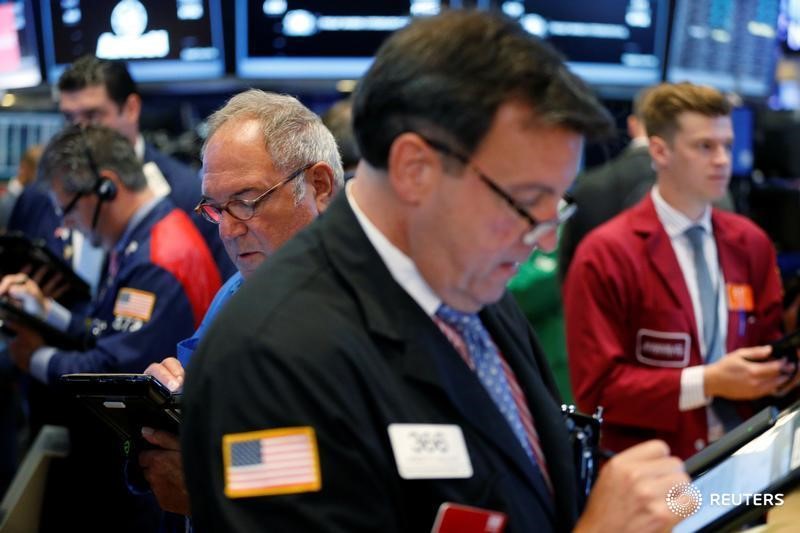By Lewis Krauskopf
NEW YORK (Reuters) - U.S. stock indexes pulled back on Friday from record peaks amid soft U.S. economic data that also weighed on the dollar and Treasury yields and tempered expectations of a near-term rise in U.S. interest rates.
A short-covering rally extended gains for oil prices, which were on track for their biggest weekly advance in at least three months.
The pan-European STOXX 600 index (STOXX) fell 0.2 percent after earlier setting a fresh seven-week high, with weakness in mining shares offsetting a surge in A.P. Moller-Maersk (CO:MAERSKb) after its earnings.
MSCI's all-world stock index (MIWD00000PUS) shed 0.1 percent, but lingered around year highs.
U.S. retail sales were unexpectedly flat in July as Americans cut back on purchases of clothing and other goods, while other data showed producer prices recorded their biggest drop in nearly a year in July.
“The retail sales number was not robust, giving a little bit more reason to question the direction of the economy again,” said Peter Tuz, president of Chase Investment Counsel in Charlottesville, Virginia.
"By and large, the news today was just a little bit blah, so there’s no reason to commit a lot of money to the stock market on a summer Friday."
The Dow Jones industrial average (DJI) fell 58.18 points, or 0.31 percent, to 18,555.34, the S&P 500 (SPX) lost 4.56 points, or 0.21 percent, to 2,181.23 and the Nasdaq Composite (IXIC) dropped 5.81 points, or 0.11 percent, to 5,222.59.
All three indexes closed at record highs on Thursday, the first time they have done so simultaneously since 1999.
Energy shares (SPNY) were the best-performing sector, rising 0.7 percent and mitigating broader declines as crude prices gained.
The recent "strength in crude has both lifted equity prices and also tended to assuage that fear that we are going into a season of protracted anemic consumer and global demand," said Peter Kenny, senior market strategist at Global Markets Advisory Group in Berkeley Heights, New Jersey. "Crude oil is an enormously important factor right now in the global market."
Oil prices rose after a short covering rally was triggered by comments from Saudi Arabia's oil minister in the previous session about possible action to help stabilize the market.
Benchmark Brent (LCOc1) climbed 1.7 percent to $46.84 a barrel, while U.S. crude (CLc1) rose 2.1 percent to $44.42 a barrel.
In the United States, cooling consumer spending and tame inflation suggest the Federal Reserve will probably not raise interest rates any time soon, despite a robust labor market.
The dollar (DXY) fell 0.2 percent against a basket of currencies.
“The U.S. retail sales data in particular is causing the dollar to weaken,” said Nick Bennenbroek, head of currency strategy at Wells Fargo (NYSE:WFC) Securities in New York.
Benchmark U.S. Treasury yields fell to their lowest level in nearly two weeks after the economic data, with 10-year Treasury notes (US10YT=RR) last rising 19/32 in price, to yield 1.5068 percent.

"The relationship is pretty straightforward, with low inflation and low growth comes lower interest rates," said Guy LeBas, chief fixed income strategist at Janney Montgomery Scott LLC in Philadelphia.